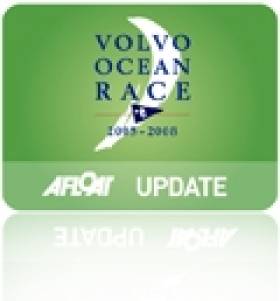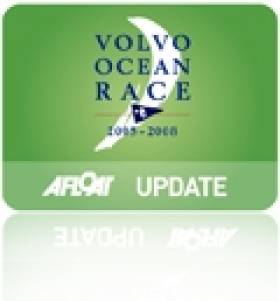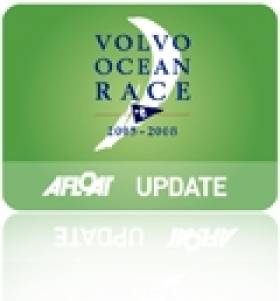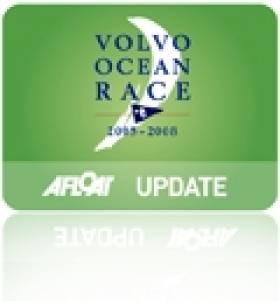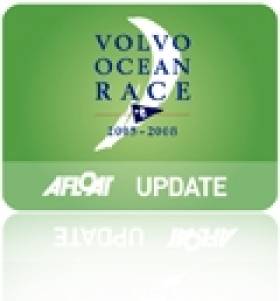Displaying items by tag: Puma
VOR Roundup: Abu Dhabi Returns, Puma Quits Sailing
#VOR - Abu Dhabi will return to the Volvo Ocean Race in 2014-15 both with a sailing team and a stopover in the UAE capital, it was announced earlier this week.
Once again skippered by Ian Walker, the team is the third confirmed entrant in the 12th edition of the round-the-world yacht race, after the all-woman Team SCA and a team representing the Brazilian state of Pernambuco.
The Abu Dhabi team joined the last edition of the race under the auspices of former commercial director David Hassett, who was previously instrumental in bringing the race to Galway for the first time in 2009, and was one of the team behind Ireland's underdog entry the Green Dragon, which surprised the yachting world by clinching three podium finishes.
Meanwhile, the stopover will be the end point of Leg 2 from Recife in Brazil, making for "one of the longest and most challenging in the 40-year history of this race" according to Volvo Ocean Race CEO Knut Frostad.
"Heading into the Southern Ocean is never easy and this route will test the sailors to the limit," he added. "The finish line in Abu Dhabi will be one of the most eagerly awaited in the race.”
The news comes two weeks after Newport in Rhode Island was announced at the sixth host port of the race - and an understanding that no Irish ports will feature in the final route, according to The Irish Times.
Elsewhere, the VOR website visits the Persico factory in Italy in where the hulls are being completed for the new design VOR 65 in its latest video update - and also takes a look at the construction of the rigs for the new boat at Southern Spars in New Zealand.
In other news, it's emerged that Puma is pulling out of the sailing market, cutting its support for the Oracle team in the America's Cup and permanently dry-docking its Volvo Ocean Race team.
Reuters reports that the decision was made in the face of dwindling profits at the German sportswear brand.
Puma came third in the last edition of the VOR, which has its successful climax in Galway last summer.
Groupama Try Out a New Watch System
#VOLVO OCEAN RACE - Has the Groupama sailing team adopted a new simplified watch system, keeping just one man on deck to handle the vessel - as demonstrated by Ireland's Damian Foxall in the video above?
Don't worry - it's just a prank for April Fool's Day yesterday!
The yacht and its full compliment of crew have rounded Cape Horn and are currently in overall second place as the Volvo Ocean Race fleet heads to Itajaí in Brazil on the fifth leg and longest passage of the race.
Groupama and PUMA are currently battling for first place on the leg, with Telefónica hot on their heels after making up 180 miles in just 36 hours with speeds near double those of the frontrunners.
VOR Second Leg Cut Short Over Piracy Concerns
#VOLVO OCEAN RACE - The second leg of the Volvo Ocean Race from Cape Town to Dubai has been cut short by organisers as a result of the growing threat of piracy in the Indian Ocean, The Irish Times reports.
The six yachts competing will be protected by armed guards as they are shipped on a secret route to the United Arab Emirates due to piracy concerns.
The boats will be transported by ship from an undisclosed location to Sharjah in the Arabian Gulf, from where they will sprint to the finish line in Abu Dhabi.
All six teams are currently in Cape Town, with Team Sanya, PUMA and Abu Dhabi Ocean Racing hoping to get back in the race after retiring in the first leg.
As previously reported on Afloat.ie, NATO recently foiled a pirate attack on a Spanish fishing vessel between the Seychelles and the Somali coast.
The Irish Times has more on the story HERE.
Puma Retires After Dismasting
The team has recovered all pieces of the mast and all sails from the water. They are currently headed toward the island of Tristan da Cunha.
"We've just withdrawn from the leg," said skipper Ken Read. "We have [the mast] jury rigged – we have about 15 feet of mast left. We have our trysail and storm jib awkwardly set. We're supplementing that with really low revs of the engine just to make forward progress.
"As you can imagine, there aren't a lot of smiles right now, but one way to make it even worse would be to proclaim that there wasn't a chance to make the next leg.
"This is about earning points in this race. We think by sacrificing points on this first leg, it gives us a chance to actually earn points for the second leg and the In-Port Race. So, that's our goal.
"We have all of our fantastic PUMA shore team, the BERG team and of course Volvo all trying to sort it out right now, giving us the help that we need to get to Cape Town in order to make repairs and be ready for the next leg."
PUMA was in second position in the first leg of the race, sailing from Alicante, Spain, to Cape Town when the mast broke. The causes of the dismasting are not known at this stage.
PUMA Ocean Racing's shore team is working on a recovery plan to ensure the yacht can rejoin the race as soon as practically possible and will work closely with Volvo Ocean Race to determine the cause of the dismasting.
Volvo Ocean Race control is in contact with the team to establish the full extent of the damage and ensure the crew are given full support to enable them to deal with the situation.
Disaster Strikes as Puma Dismasted in Volvo Ocean Race
The rig onboard PUMA's Mar Mostro failed at around 15:00 UTC in the southern Atlantic Ocean, about 2,150 nautical miles from Cape Town, South Africa.
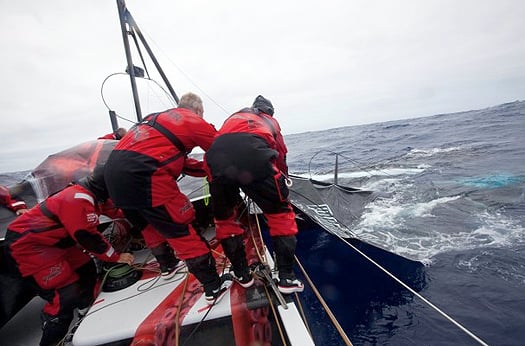
Puma crew try to retrieve the broken rig. Photo: Amory Ross/PUMA Ocean Racing/Volvo Ocean Race
Skipper Ken read reported: "We were sailing on a port tack, beam reaching in 22-23 knots of breeze, heading east northeast with eight to 10 foot waves when the mast failed. There were no warning signs.
"There was no panic onboard, and all crew are safe and well.
"Thanks to amazing seamanship, the three pieces of the mast and all of the sails were recovered. We haven't suspended racing at this point and are weighing up our options.
"At this point we are not using our engine, but are taking some time to clear our heads and evaluate next steps. Our plans may include heading to the island of Tristan da Cunha – about 700 nautical miles from us, nearly on the way to Cape Town.
"This is the saddest and most disappointed 11 people on earth. We were in a comfortable second position, traveling south to get into the final front and head across the southern Atlantic towards Cape Town.
"We were planning to be there in five days. At this stage, my goal is to make sure we get this crew back safely and we will look at options as to how to get back in this race."
The Brazilian search and rescue organization have been informed and are on standby to assist if necessary.
PUMA Ocean Racing's shore team is working on a recovery plan to ensure the yacht can rejoin the race as soon as practically possible and will work closely with Volvo Ocean Race to determine the cause of the dismasting.
Volvo Ocean Race control is in constant contact with the team to establish the full extent of the damage and ensure the crew are given full support to enable them to deal with the situation.
The causes of the dismasting are not known at this stage. However, the rig is of a different origin and manufacture to that of Abu Dhabi Ocean Racing's Azzam which suffered a failure earlier during Leg 1.
Further information will be issued as it becomes available.
Coast Guard Winchman Retires after 30 Years' Service
Noel Donnelly (55), who is retiring after more than 30 years' service, worked as winchman and paramedic. He completed his last shift at the Sligo Coast Guard search and rescue base last week and retires officially this month.
Originally from Tyrone, Mr Donnelly began his career with the Air Corps, flying in Alouette and Puma helicopters. He left in 1984 to take a job as a diver with a civil engineering firm in Aberdeen, Scotland, and subsequently worked as an ambulance driver in Co Kildare. For more about this article please click here



























